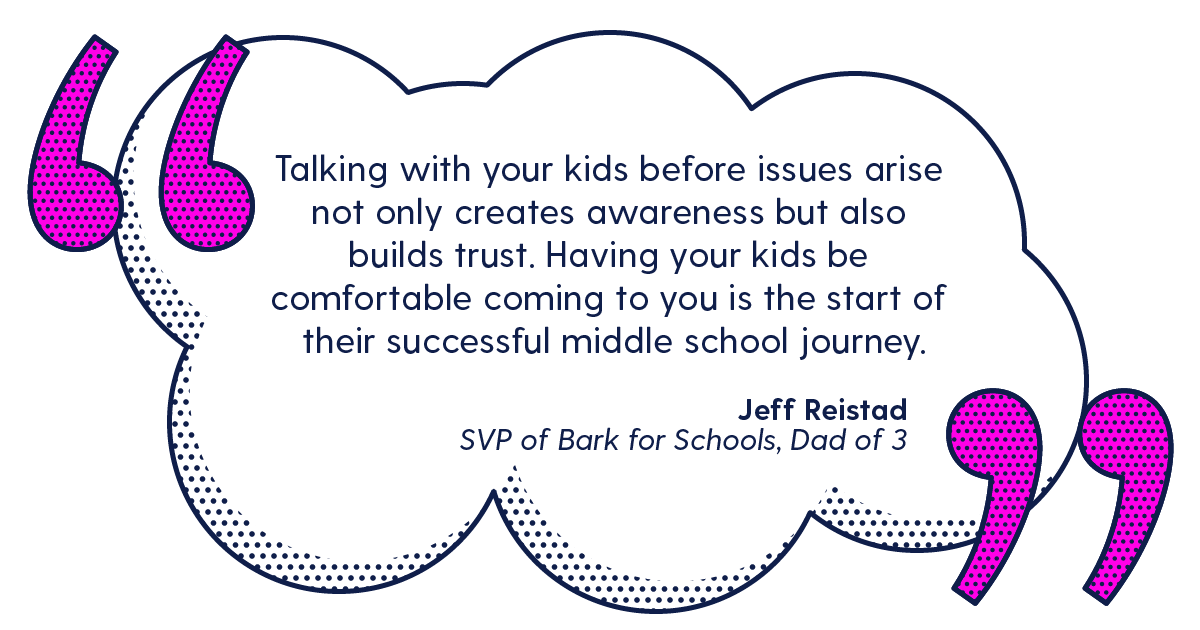
Middle school can be the hardest part of growing up. Bodies change, hormones rage, and boundaries begin to be tested as kids transform into teenagers. It’s also a crucial time for development in a child’s life, and there are many opportunities for important discussions that will help shape them into well-rounded and socially-conscious adults.
To help you and your middle schooler get through these challenging years, we created this handy parent's guide on how to survive middle school that will give you a little bit of perspective, help you understand them better, and provide you with strategies for helping them thrive.
Tips On How to Survive Middle School (As a Parent)
1. Middle Schoolers Are Inconsistent
Because their prefrontal cortex isn’t fully developed yet, your tween or teen will rely on their amygdala to make decisions. This “fight or flight” part of the brain can lead your middle schooler to make impulsive choices to reward the pleasure-seeking areas of the brain. Talking with your child about what changes their body is going through can help them understand why they are getting acne, acting reckless, and experiencing emotional outbursts. Having these discussions earlier, rather than later, will make it easier for you both to step back during a disagreement and understand why you may not be seeing eye to eye.
“Middle schoolers are a jumble of contradictions and inconsistencies. They can be sullen at home but delightful with teachers. They can be risk-takers on the athletic field but cautious in class. The same kid who asks you to read to them on Monday might ask you to get out of their life (and their room) on Tuesday.” — Phyllis L. Fagell, LCP
2. They Want to Feel Seen and Heard
Middle schoolers are really just starting to understand their place in the world. And while they don’t know who they are just yet, it’s not your job to tell them — but rather to support them — as they figure it out along the way.
As adults, it can be easy for us not to take our kids seriously or assume that our way is the only way. But this can be extremely frustrating for kids. The greatest way to show your child that you respect their opinions, dreams, and fears is by simply listening. Fight the urge to insert your own advice. Being patient now will make them more likely to come to you in the future when they want to talk through more serious topics.
“Help your child find their passion as soon as possible. Then give them a goal that lines up with that passion. Put a date on the calendar for that goal. When you are working towards something together then you are less likely to fight with each other.” — Matt McKee, Bark VP of Business Development, Dad of 2

3. Be Realistic About What They’ll Encounter
Technology is a powerful tool, but it doesn’t come without its own set of dangers. These days, middle school is a popular time for children to receive their first smartphone or laptop, which is why it’s an important time to talk about issues like cyberbullying, sexting, and online predators. Although these topics can be difficult to discuss, they’ll help your child identify when problems arise and come to you for help.
“Talking with your kids before issues arise not only creates awareness but also builds trust. Having your kids be comfortable coming to you is the start of their successful middle school journey.” — Jeff Reistad, SVP of Bark for Schools, Dad of 3
It’s also important to help your child understand that what they send, share, and post online can ruin their reputation in a matter of moments. Distasteful online activities are permanent, and even if they delete them from their personal pages, anyone who sees the posts can preserve them with screenshots.
4. FOMO is Real
While FOMO (Fear Of Missing Out) typically refers to not being able to participate in a certain activity, it can take many different shapes and forms — especially in middle school. Whether it’s not having the trendiest wardrobe or being the only one who still doesn’t have a cell phone, middle schoolers can feel alienated and left out when they are unable to conform to what their peers are doing.
These feelings are amplified when you consider how connected the world is — kids especially are posting everything they do online. Seeing that friends from school are all hanging out when they didn’t get an invite, or not getting as many “likes” as their friends, can be a hard pill to swallow as a middle schooler. However, experiencing FOMO is a great opportunity to explain to your child that it’s just a fact of life that they won’t be able to participate in everything their friends are doing and that their reputation is not dependent on the number of followers they have on Instagram.
“Generally speaking, parents may often suspect the measurable mass of any middle school FOMO is inversely proportional to the lack of insignificance triggering it. That is, the more unremarkable the minutia of a moment, the more it seemingly matters to middle school students. That trip they missed to the lake with Aunt Becky? “Sure, that would have been fun (I guess).” But not going to the mall with Sam? On a Saturday? “IT WAS THE EVENT OF THE SEASON! MY LIFE IS RUINED.” — Whit Honea, Data Annotation Team Lead, Dad of 2
5. They Are Going to Test Boundaries
As your middle schooler starts to gain a sense of independence, they will begin to feel out just how much freedom they actually have. In today’s digital world, that usually means pushing the envelope using their smartphones and social media. And when they decide to start testing their online boundaries, Bark can help.
Bark uses advanced algorithms to detect signs of digital dangers children face online, such as cyberbullying, sexting, and signs of depression, and suicidal thoughts. Bark also offers screen time management and web filtering features that give parents and guardians an additional digital safety net for their kids.
“This app was recommended by the school and it couldn't have come at a better time. My son recently lost his phone privileges and wanted to earn them back, but I was apprehensive. I downloaded Bark and we were able to have a dialogue about what was to be expected. In the first few days, we did have some hiccups — the app alerted me to a few web searches, subjects, and DMs in Snapchat and Instagram that needed to be addressed immediately. I love how easy Bark is to use! It’s also affordable and gives me a little peace of mind while still allowing them to maintain their personal space.” — Bark Mom
Helping Keep Middle School Kids Safe
Middle school has always been hard, but today’s generation has to deal with technology we couldn’t even dream of when we were kids. If you need advice or support on how to survive middle school, join our community of over 37,000 parents going through similar situations in Parenting in a Tech World.
Read more
Bark helps families manage and protect their children’s digital lives.





